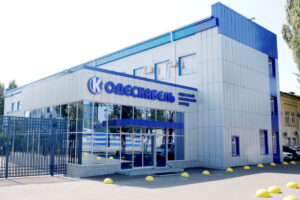
In July-September of this year, the large Ukrainian cable plant Odeskabel received net sales revenue of UAH 734.4 million, which is 10% more than in the third quarter of last year.
According to the description of economic activity in the company’s interim report, during this period it produced 2,103 tons of copper cable and wire products worth UAH 696.4 million, compared to 1,531 tons worth UAH 578.2 million in the third quarter of last year.
Average selling prices for cable products for the reporting period of 2025, as in 2024, ranged from UAH 600,000 to UAH 1.5 million/km, depending on the brand size.
In July-September 2025, products worth UAH 171.9 million were exported, which is 23.3% of sales, while last year during this period, exports amounted to UAH 148.7 million (22.3%).
As in the previous year, the plant used 70-80% of its equipment during the reporting period.
The report does not contain data on financial results for January-September 2025 or 2024.
As reported, in the first quarter of this year, the plant increased its net income by 70.2% compared to the same period in 2024, to UAH 738 million, and in the second quarter, by 33.5% compared to the same period last year, to UAH 737.4 million.
PJSC “Odeskabel” produces a wide range of communication, radio frequency, digital, and LAN cables, with the widest range of products on the Eastern European market. It also produces power and heating cables, wires, and cords.
In Ukraine, the company’s products are used by telecommunications operators and energy networks, among others.
As of October 1, 2025, the plant employed nearly 820 people.
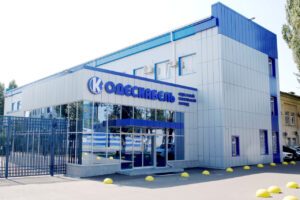
In April-June of this year, the large Ukrainian cable plant Odeskabel received net sales revenue of UAH 737.4 million, which is 33.5% more than in the second quarter of last year.
According to the company’s interim report, during this period, it produced 2,279 tons of copper cable and wire products worth UAH 722.8 million, compared to 1,700 tons worth UAH 578.2 million in the second quarter of last year.
Average selling prices for cable products for the reporting period of 2025, as in 2024, ranged from UAH 600,000 to UAH 1.5 million/km, depending on the brand size.
In April-June 2025, products worth UAH 134.5 million (18.2% of sales) were exported, while in the second quarter of last year, products worth UAH 139.5 million (25.3%) were exported.
As in the previous year, the plant used 70-80% of its equipment during the reporting period.
The report does not contain data on financial results (profit or loss) for the second quarter of both 2025 and 2024.
Odeskabel lists the following issues affecting its operations: high interest rates on bank loans, lack of state orders for domestic manufacturers’ products, refusal of foreign partners to cooperate with Ukraine in the context of the war, and complications in crossing the border for business trips.
According to the company’s interim report for the first quarter of this year, it increased its net sales revenue by 70.2% compared to the same period in 2024, to UAH 738 million, with exports accounting for 22% of sales (UAH 159.7 million), compared to 23.6% (UAH 98.4 million) in the first quarter of 2024.
PJSC “Odeskabel” produces a wide range of communication, radio frequency, digital, and LAN cables, with the most extensive range on the Eastern European market. It also produces power and heating cables, wires, and cords.
In Ukraine, the company’s products are used by telecommunications operators and energy networks, among others.
At the end of the first half of the year, the plant employed more than 800 people.
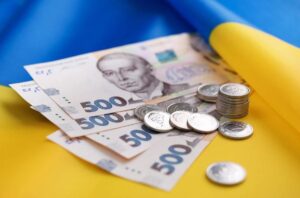
Taxes, fees, and mandatory payments to the general and special funds of Ukraine’s state budget amounted to UAH 2.71 trillion over the first nine months of 2025, while cash expenditures amounted to UAH 3.63 trillion, which is approximately 25.0% and 22.1% higher than the corresponding figures for the first nine months of 2024.
According to operational data from the State Treasury Service, which the Ministry of Finance published on its website, general fund revenues increased by 24.5% to UAH 1.92 trillion, while expenditures increased by 20.4% to UAH 2.82 trillion.
In September this year, state budget revenues increased by 28.7% compared to September last year, to UAH 298.5 billion, including the general fund – by 69.6%, to UAH 208.4 billion. This is due to the receipt of grants worth UAH 53.9 billion last month, while in September 2024 there were none.
It is noted that the largest source of revenue in January-September this year remains VAT on goods imported into the customs territory of Ukraine – UAH 390.3 billion (UAH 342.3 billion in the first nine months of 2024).
After raising the military tax from 1.5% to 5% and introducing a condition for reserving a salary of UAH 20,000 this year, personal income tax and military tax moved from fourth to second place in terms of revenue for the first nine months of this year – UAH 260.9 billion compared to UAH 154.7 billion last year.
In third place this year is VAT on goods produced in Ukraine – UAH 231.6 billion for refunds of UAH 131.2 billion (UAH 197.6 billion for refunds of UAH 109.7 billion), while corporate income tax amounted to UAH 219.7 billion (UAH 200.9 billion) and fell to fourth place, with excise tax almost catching up with it at UAH 210.5 billion (UAH 150.9 billion).
In addition, dividends and parts of the net profit of state-owned companies amounted to UAH 64.5 billion (UAH 66.6 billion), import and export duties – UAH 40.0 billion (UAH 35.7 billion), and rent payments for the use of subsoil resources – UAH 31.5 billion (UAH 36.3 billion).
The Ministry of Finance added that another UAH 84.2 billion (UAH 38.6 billion) was added to the budget from the National Bank’s profits, and grants amounted to UAH 308.8 billion (UAH 268.3 billion).
Revenues from the unified social tax to pension and social insurance funds in January-September 2025 increased by 21.9% to UAH 479.2 billion, including in September by 19.3% to UAH 55.7 billion.
The Ministry of Finance also reported that as part of the financing of the general fund of the state budget, state borrowings to it in January-September 2025 amounted to UAH 1.32 trillion, or 92.9% of the plan, including UAH 382.3 billion received on the domestic market from the placement of government bonds (UAH 390.8 billion for the first nine months of 2024), including UAH 90.1 billion in foreign currency – $1.44 billion and EUR 638.3 million. At the same time, UAH 172.0 billion was raised through the issuance of military government bonds.
According to the release, approximately $22.6 billion or UAH 938.1 billion was received from external sources, including approximately $14.5 billion under the ERA, with the total volume of this mechanism amounting to $50 billion.
In addition, Ukraine received another EUR 6.14 billion from the EU under the Ukraine Facility preferential long-term loan, $0.96 billion from the International Monetary Fund (IMF), and $0.26 billion from the World Bank for the projects “Transforming Health Care through Reform and Investment in Efficiency” (THRIVE), “Creating Resilient Infrastructure in Vulnerable Environments in Ukraine” (DRIVE), and “Modernization of the Social Support System for the Population of Ukraine.”
Payments on the repayment of public debt for January-September 2025 amounted to UAH 450.9 billion, or 95.4% of the plan, and payments on servicing amounted to UAH 246.3 billion, or 96.3% of the plan.
As reported, the 2025 state budget was approved with revenues of UAH 2 trillion 327.1 billion, including the general fund – UAH 2 trillion 133.3 billion (excluding grants and international assistance), and expenditures of UAH 3 trillion 929.1 billion, including the general fund – UAH 3 trillion 591.6 billion. At the end of July, the Verkhovna Rada, at the government’s suggestion, increased this year’s budget expenditures by UAH 400.5 billion and revenues by UAH 147.5 billion, but in October, the government again proposed to increase defense expenditures by another UAH 317 billion.
In 2024, the state budget received UAH 3 trillion 120.5 billion in revenues, which is UAH 448 billion, or 16.8%, more than the 2023 state budget. The general fund’s revenue growth amounted to UAH 513.9 billion, or 30.9%, to UAH 2 trillion 177 billion, in particular, international financial assistance in the form of grants amounted to UAH 453.6 billion compared to UAH 433.9 billion in 2023.
State budget expenditures in 2024 increased by UAH 464.5 billion, or 11.6%, compared to 2023, to UAH 4 trillion 479.3 billion, in particular, under the general fund – by 15%, or UAH 454.5 billion – to UAH 3 trillion 488.8 billion.
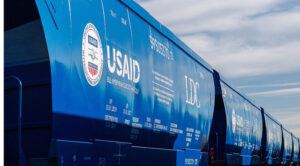
Louis Dreyfus Company B.V. (LDC), one of the world’s largest traders and processors of agricultural products, reported its consolidated financial results for the first half of 2025, the company said.
According to the report, the group’s net revenue amounted to $26.2 billion (compared to $25.6 billion a year earlier), EBITDA was $987 million ($1.057 billion in 2024), and segment operating profit was $1.217 billion ($1.284 billion in 2024) . Net profit attributable to the group’s shareholders amounted to $418 million, compared to $489 million a year earlier.
The company emphasized that, despite geopolitical, regulatory, and climate challenges, it managed to increase sales by 4.4% year-on-year, maintain positive investment momentum, and expand its asset network.
During the reporting period:
in North America, construction of new oil and fat plants in Canada and the US continued;
in South America, grain and oilseed capacities were increased in Argentina, a coffee factory in Brazil was expanded, and a new terminal for sugar exports was commissioned;
In Asia, processing facilities were commissioned in Indonesia and China, including a food technology park in Dongjiao.
The retail product range was expanded, including entry into the European and Asian markets with Montebelo Brasil juices.
LDC CEO Michael Gelchi noted: “Thanks to the flexibility and dedication of our teams, despite market volatility, we have maintained strong results and continued the strategic transformation of the company into a more integrated, innovative, and sustainable business.”
Louis Dreyfus Company, founded in 1851, is a global trading and processing company active in more than 100 countries, with a network of approximately 19,000 employees. In Ukraine, LDC operates through subsidiaries, engaging in the procurement, storage, processing, and export of grains and oilseeds, as well as investments in infrastructure (elevators, terminals). The company is one of the largest agricultural traders in the country.

In January-June 2025, the logistics company TAS-Logistic LLC reduced its revenue by 4.7 times compared to the same period last year, to UAH 91.14 million.
According to a report in the disclosure system of the National Securities and Stock Market Commission, the company’s net loss amounted to UAH 89.04 million, compared to a net profit of UAH 89.50 million in the first half of 2024.
It is noted that the gross loss for January-June this year amounted to UAH 26.17 million, while for the same period in 2024, a gross profit of UAH 310.68 million was recorded.
The operating loss for the first half of 2025 amounted to UAH 32.00 million, compared to UAH 224.44 million in operating profit for the first half of 2024.
During the reporting period, the company managed to reduce long-term bank loans from UAH 264.4 million to UAH 220.8 million, other long-term liabilities from UAH 471.7 million to UAH 415.5 million, while current accounts payable on long-term liabilities increased from UAH 181.8 million to UAH 229.8 million, and other current liabilities from UAH 225.4 million to UAH 313.7 million.
TAS-Logistic is part of the TAS group, owned by Serhiy Tihipko. The company provides a full range of transport and logistics services for the transportation of grain and oilseeds, as well as sea transportation of import and export cargo through the main seaports of Ukraine and Europe with full logistics support.
The company’s fleet includes more than 1,700 grain cars and 160 semi-cars, 161 flatcars, and 52 tank cars.
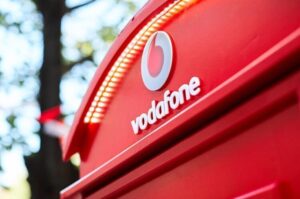
Vodafone Ukraine (VFU), Ukraine’s second-largest mobile operator, reduced its net profit by 13% in the first half of 2025 compared to the same period last year, to UAH 1.705 billion, while its revenue grew by 15% to UAH 13.518 billion.
“The main growth factors remain the development of the fixed-line business, an increase in the volume of data services and the number of Internet users, and, accordingly, revenues from services, both mobile and fixed-line,” the company said in its financial report on Friday.
According to the report, the decrease in net profit was caused by additional expenses related to the two-year deferral of payments on Eurobonds, as well as an increase in debt servicing costs due to a 1.5-fold increase in the interest rate in accordance with the new restructuring terms.
As reported, in January-March 2025, revenue increased by 14% compared to the same period in 2024, to UAH 6.59 billion, while net profit fell by 24%, to UAH 697 million.
Vodafone Ukraine notes that OIBDA in the first half of 2025 increased by 12% compared to the first half of 2024, to UAH 7.17 billion, while the OIBDA margin decreased by 1.7 percentage points compared to the same period last year, to 53.1%.
The company emphasized that in the first half of the year, it increased its investments by 66% compared to the same period in 2024, investing more than UAH 3.5 billion in critical infrastructure, and in total, over 3.5 years of full-scale war, investments in Ukraine reached almost UAH 19 billion.
In the structure of investments in the first half of this year, 51% is accounted for by the construction and restoration of the network, as well as its preparation for operation during blackouts, 31% – network maintenance, 11% – fixed-line communications development, and 4% – the billing exchange program.
It is noted that the company’s net debt in the middle of this year amounted to UAH 13.65 billion: UAH 23.55 billion in gross debt, of which UAH 12.43 billion was in Eurobonds, against UAH 9.9 billion in free cash, including government bonds.
Vodafone Ukraine also noted that in July-August 2025, it paid dividends totaling UAH 97 million.
According to the report, in the second quarter of 2025, the number of customers decreased by 3.1% compared to the same period last year, to 15.4 million, but ARPU (average revenue per user per month) increased by 18.5% to UAH 136.
Vodafone announced that it had introduced innovative energy-saving technology Powerstar 2.0, based on artificial intelligence, and began connecting mobile base stations via passive xPON (1/10 Gigabit/s Passive Optical Network) optical networks, which should allow for a relatively quick transition to new mobile communication technologies – 5G and, in the future, 6G.
In addition, the modernization of the telecom infrastructure of the fixed-line operator Frinet, which has been part of the group since August 2023, has begun: replacement of the FTTB network with GPON, which will provide customers with up to 72 hours of autonomous operation and 10 times faster internet speed.
It is also noted that in May 2025, Vodafone Ukraine received and began using the 1940–1945/2130–2135 MHz radio frequencies, which previously belonged to the operator TriMob, which made it possible to increase the efficiency of spectrum use and strengthen network capacity.
According to the financial statements, in August 2025, the Group committed to participate in a joint project to build a new submarine cable system across the Black Sea, connecting Ukraine to the international transit route between Europe and Asia. The system will connect Bulgaria, Ukraine, Georgia, and Turkey, and is expected to be completed within five years. The total cost to the group is estimated at EUR65 million.
Vodafone Ukraine has been part of NEQSOL Holding since December 2019.